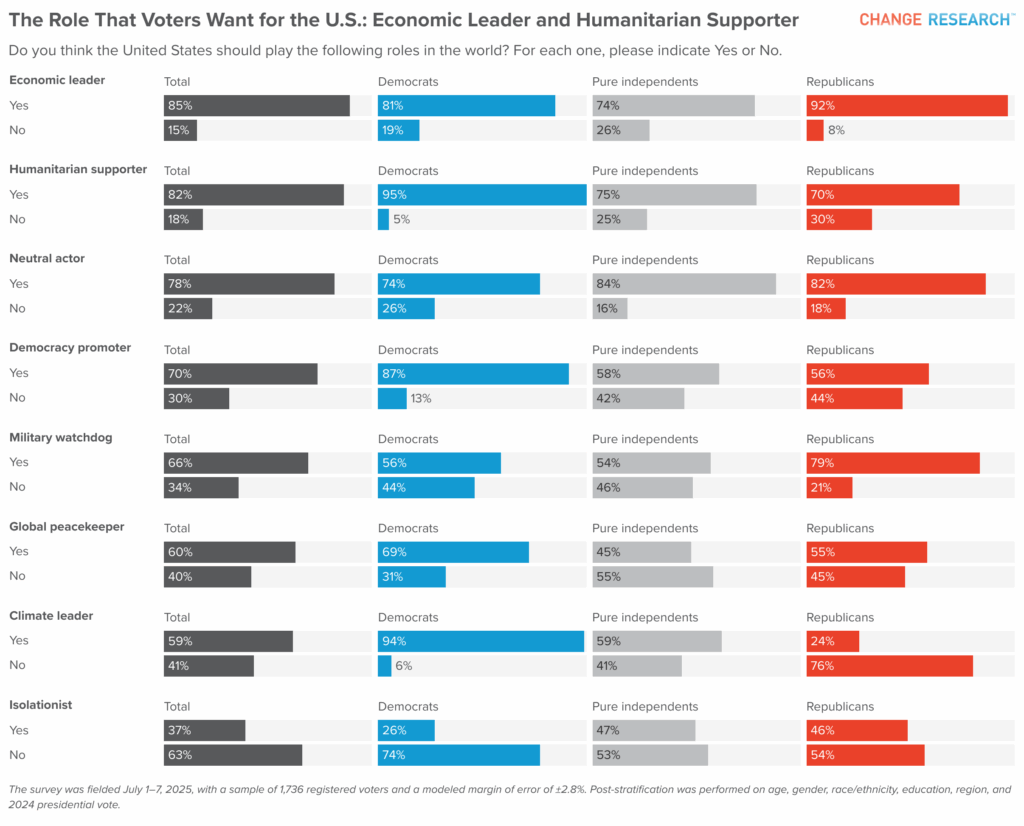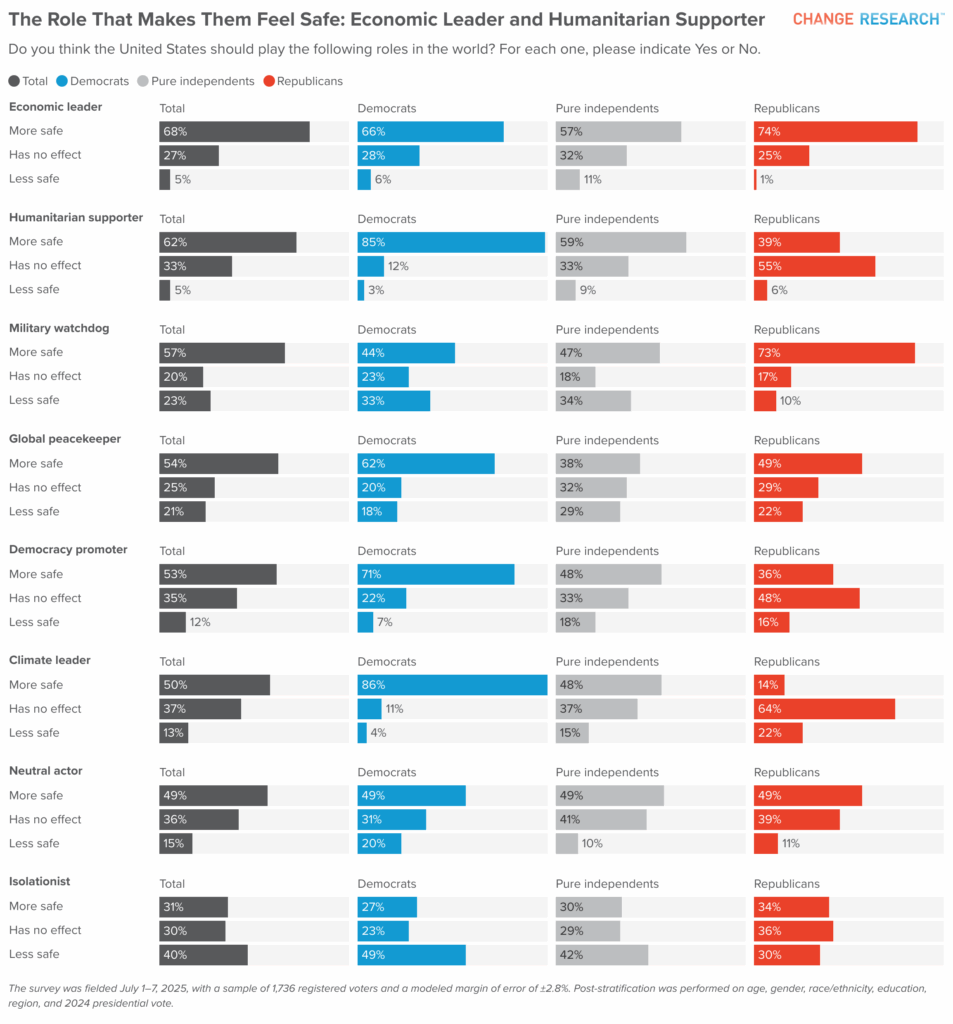Most American voters want the United States to remain engaged in the world, and they see that engagement as essential to national safety. A new Compass Poll by Change Research of 1,736 registered voters, fielded July 1–7, 2025, asked participants two related questions about U.S. foreign policy: whether they think the United States should play specific roles in the world, and whether each role would make them feel safer, less safe, or have no effect. The findings reveal strong support for active international leadership on certain dimensions, widespread rejection of isolationism, and shared ground on the safety benefits of engagement.
Strong Support for Economic and Humanitarian Leadership
Among the roles tested, Americans show the highest levels of support for the United States acting as an economic leader and a humanitarian supporter. Overall, 85% say the U.S. should be an economic leader in the world. This position enjoys bipartisan support, with 92% of Republicans, 81% of Democrats, and 74% of independents in favor. Humanitarian support also draws broad approval: 82% of voters overall agree that the U.S. should act as a humanitarian supporter, with near-unanimous agreement among Democrats at 95%, and clear majorities among Republicans at 70% and independents at 75%.

This strong support aligns with perceptions of safety. Sixty-eight percent say that the U.S. acting as an economic leader would make them feel safer, while 62% say the same about being a humanitarian supporter. These findings suggest that Americans see value in these roles and believe they directly contribute to national security.
While economic leadership makes respondents feel safer, we see a partisan divide on humanitarian support: 74% of Republicans say economic leadership makes them feel safer, and 39% say humanitarian support does, while 66% of Democrats say economic leadership makes them feel safer and 85% say humanitarian support does.

Americans Reject Isolationism
Americans support a variety of active roles for the U.S., and they largely reject the idea of isolationism. Overall, 63% of voters say the country should not pursue an isolationist stance. This rejection is strongest among Democrats, with 74% saying no to isolationism; among Republicans, a majority (54%) oppose it.
When asked about safety, only 31% believe isolationism would make the country safer, while 40% say it would make the country less safe. This mismatch between perceived benefits and drawbacks suggests that voters see disengagement as a risk rather than a shield. Even with partisan differences over specific leadership roles, there is general agreement that withdrawing from global affairs is not the path to greater security.
Views on Military, Democracy, and Climate Roles
Voters broadly favor international engagement, and they express more mixed views on certain roles, often shaped by partisanship. The US acting as a military watchdog garners 66% support overall, with Republicans (79%) more supportive than Democrats (56%). Perceptions of safety follow similar lines: 73% of Republicans say this role would make the country safer, compared with 44% of Democrats.
Promoting democracy abroad receives 70% overall support, with Democrats (87%) strongly in favor and Republicans (56%) less so. Just over half of voters, 53%, say it would make the U.S. safer.
Climate leadership has one of the sharpest partisan divides. While 59% of voters overall support the U.S. taking on this role, that figure includes 94% of Democrats and just 24% of Republicans. Similarly, 86% of Democrats believe it would make the country safer, compared with only 14% of Republicans. These differences highlight distinct partisan visions for U.S. leadership and its relationship to national security.
Support for Neutrality and Peacekeeping
Beyond direct leadership or advocacy roles, many voters support the U.S. behaving as a neutral actor or global peacekeeper. Seventy-eight percent of voters want the U.S. to serve as a neutral actor in global conflicts, with relatively little partisan difference. However, perceptions of the safety benefits are more muted: 49% say this role would make the U.S. safer, while 36% think it would have no effect.
Global peacekeeping also draws majority support, with 60% of voters in favor. Democrats (69%) are more supportive than Republicans (55%), and 54% of voters say this role would make the country safer. These roles suggest some shared partisan ground, with many Americans valuing stability and conflict resolution even if they debate how active that involvement should be.
The Bottom Line: Americans See Global Engagement as Key to Safety
Overall, the survey reveals that the roles Americans want the U.S. to play in the world align closely with those they believe will make them safer. The most popular roles—economic leader and humanitarian supporter—are also the ones most widely seen as enhancing security. Meanwhile, isolationism is both less popular and viewed as less safe.
Despite partisan differences over which roles should be prioritized, there is clear shared ground on the need for global engagement. Republicans often favor military strength and economic leadership, while Democrats emphasize humanitarian aid, democracy promotion, and climate leadership. Independents typically fall somewhere in between, favoring engagement while remaining cautious about certain approaches.
While Americans may debate how the U.S. should lead, there is widespread agreement that it should lead—and that such leadership is vital not just for America’s role in the world, but for Americans’ own sense of safety at home.
Methodology: The survey was conducted July 1–7, 2025, with 1,736 registered voters. The modeled margin of error is ±2.8%. Post-stratification was performed on age, gender, race/ethnicity, education, region, and 2024 presidential vote.
Interested in seeing these results broken out by age, race, or other demographics? Sign up for the portal.
